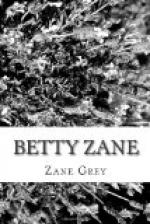For many years he was considered the right hand of the defense of the fort. The Indians held him in superstitious dread, and the fact that he was known to be in the settlement had averted more than one attack by the Indians.
Many regarded Wetzel as a savage, a man who was mad for the blood of the red men, and without one redeeming quality. But this was an unjust opinion. When that restless fever for revenge left him—it was not always with him—he was quiet and peaceable. To those few who knew him well he was even amiable. But Wetzel, although known to everyone, cared for few. He spent little time in the settlements and rarely spoke except when addressed.
Nature had singularly fitted him for his pre-eminent position among scouts and hunters. He was tall and broad across the shoulders; his strength, agility and endurance were marvelous; he had an eagle eye, the sagacity of the bloodhound, and that intuitive knowledge which plays such an important part in a hunter’s life. He knew not fear. He was daring where daring was the wiser part. Crafty, tireless and implacable, Wetzel was incomparable in his vocation.
His long raven-black hair, of which he was vain, when combed out reached to within a foot of the ground. He had a rare scalp, one for which the Indians would have bartered anything.
A favorite Indian decoy, and the most fatal one, was the imitation of the call of the wild turkey. It had often happened that men from the settlements who had gone out for a turkey which had been gobbling, had not returned.
For several mornings Wetzel had heard a turkey call, and becoming suspicious of it, had determined to satisfy himself. On the east side of the creek hill there was a cavern some fifty or sixty yards above the water. The entrance to this cavern was concealed by vines and foliage. Wetzel knew of it, and, crossing the stream some distance above, he made a wide circuit and came up back of the cave. Here he concealed himself in a clump of bushes and waited. He had not been there long when directly below him sounded the cry, “Chug-a-lug, Chug-a-lug, Chug-a-lug.” At the same time the polished head and brawny shoulders of an Indian warrior rose out of the cavern. Peering cautiously around, the savage again gave the peculiar cry, and then sank back out of sight. Wetzel screened himself safely in his position and watched the savage repeat the action at least ten times before he made up his mind that the Indian was alone in the cave. When he had satisfied himself of this he took a quick aim at the twisted tuft of hair and fired. Without waiting to see the result of his shot—so well did he trust his unerring aim—he climbed down the steep bank and brushing aside the vines entered the cave. A stalwart Indian lay in the entrance with his face pressed down on the vines. He still clutched in his sinewy fingers the buckhorn mouthpiece with which he had made the calls that had resulted in his death.




